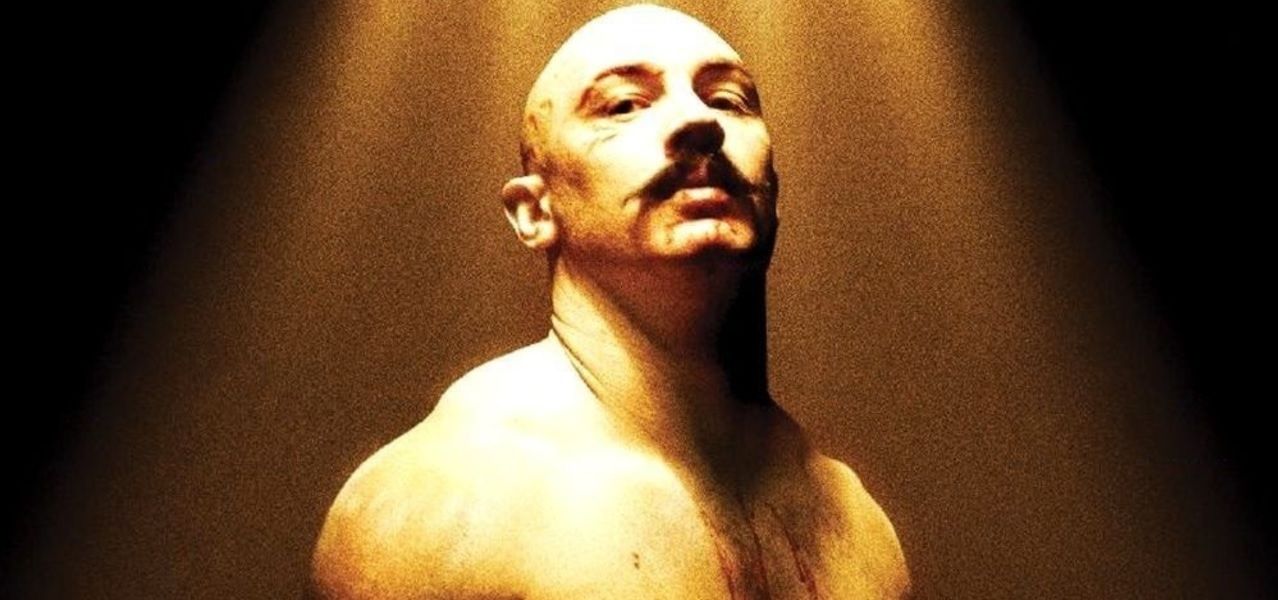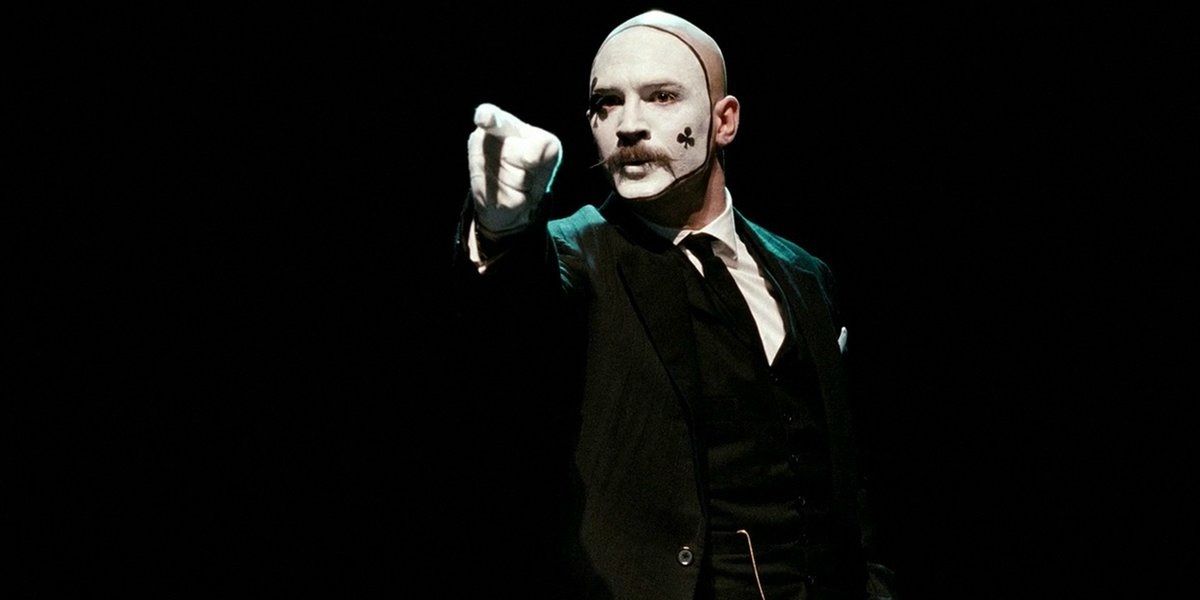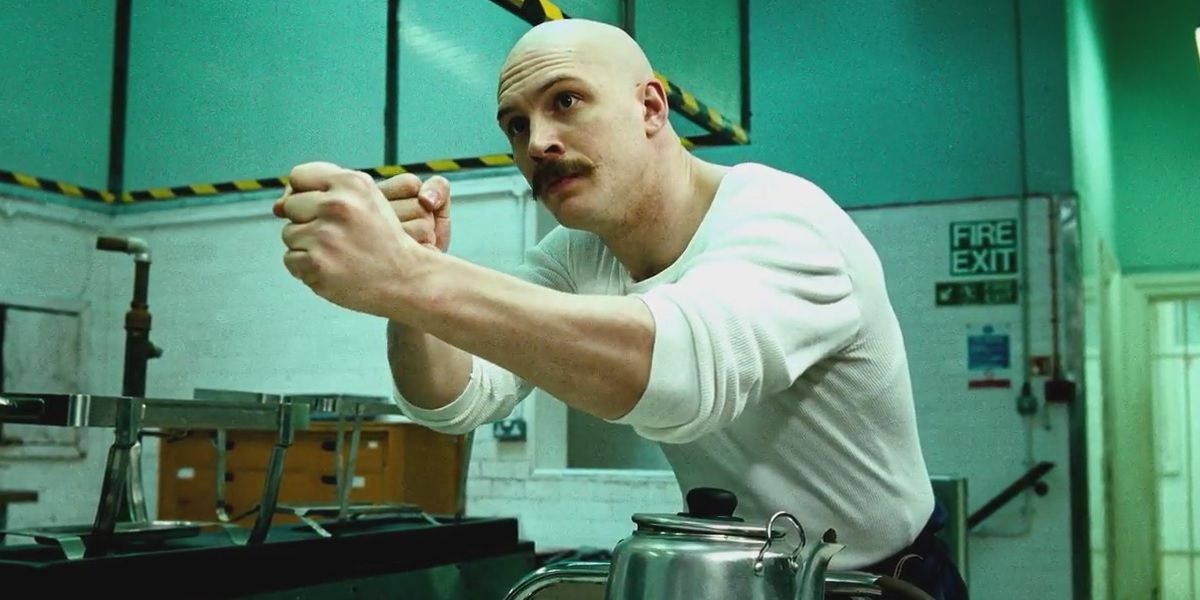To American audiences, the name Charles Bronson is probably more likely to evoke a mental image of the actor who starred in some of the most iconic westerns and war movies of the 1960s, not to mention the Death Wish series. But in the United Kingdom, another Charles Bronson set out to make a name for himself (albeit while borrowing actor Charles Bronson's moniker) and succeeded in doing so, becoming Britain's most famous prisoner and the subject of Nicolas Winding Refn's 2009 film Bronson.
Starring Tom Hardy in the title role, Bronson's narrative is framed by a stage performance in which Charles Bronson - who was born as Michael Peterson - narrates his life story to a theater full of enraptured, well-dressed audience members. "All my life I've wanted to be famous," he tells them, and proceeds to explain how he went about achieving that fame. His career as a professional prisoner began with the armed robbery of a post office and an original sentence of seven years that was handed down in 1974. Over forty years later, Bronson (now going by the name Charles Salvador) remains in prison, where he will likely spend the rest of his life.
"I remember when I was very young... I didn't want to be famous, I wanted to be real f---ing famous," Refn said during a special Q&A following a screening of Bronson in London last week. "I wanted to be so famous you couldn't imagine it. And that hunger I can really identify with... and that became what Charlie Bronson - my film - was about."
Bronson is autobiographical not only in the sense of Hardy's character narrating his own life, but also in how much of himself Refn saw in this peculiar character at the heart of Britain's criminal justice system. When he was first approached by producer Rupert Preston, who had been trying to get the film made for several years, Refn had never even heard of Charles Bronson.
"I was over here [in England] at a very depressing time in my life, directing Miss Marple for TV. [Laughter]. I needed the money. And [Preston] said, 'Look, I know you're trying to do this Viking thing [Valhalla Rising], but I just purchased the rights to this guy Charlie Bronson, and I think it's something for you.' And I was like, 'Who is that?' 'Well, he's Britain's most violent prisoner, and apparently he did a lot of violent things.' And I was like, 'No, I can't, I don't want to do another violent movie.'"
Refn changed his mind after being visited in London by his mother, who randomly picked up and read Bronson's autobiography, which Preston had left for the director to read. "She said, 'It's kind of funny, he's a bit like you'," the director recalled. After reading the book himself, Refn was intrigued but struggled to come up with the right approach for a movie adaptation. Suddenly, he realized: "Oh my god, it's me. He wants to be famous. That's the way in. That's the drive for this guy - is fame."
It wouldn't be completely accurate to say that Bronson was a career-making movie for Hardy, who has doggedly climbed his way to the top of the film industry rather than having a single breakout hit. Nonetheless, the powerhouse performance was a significant milestone in building Hardy's reputation as an intense and dedicated performer. Watching the film again, it's difficult to believe that Hardy almost wasn't cast in the role, and was in fact a considerable way down the list of Refn's preferred choices.
"I originally wanted Jason Statham, and I offered the role to Jason Statham. At first I met with him before he read the script, and he was really into the idea of this prison fight movie... [Laughter] And he had seen the Pusher films so he was like, 'It's like that.' And I was like, 'Well, kinda...' [Laughter] And then he read the script and was like, 'Ah, that's not going to happen.'"
It's hardly surprising that Statham - along with Guy Pearce, who was Refn's second choice - turned down the role as it was written. The script not only called for a cabaret performance with drag make-up, but also for an extensive amount of full-frontal nudity, including a scene in which a naked Bronson forces a male hostage to rub butter over his back and buttocks. Finding an actor who was both willing and able to handle such a role proved to be a nigh-impossible feat.
"We were getting close to our start date and we had no leading man for this thing, and I had met Tom Hardy before but it didn't really click between us when we first met. We were looking at other actors and I couldn't find anyone that I felt could do it, and then the casting director Des Hamilton said, 'I really think there is just Tom Hardy.' And then we met again, Tom and I, just the two of us this time, without anyone else involved. And he was so, like... 'Of course you're Bronson. It was you all along. I just had to take a stupid detour, but here you are.'"
Refn wasn't shy about the fact that Bronson takes creative liberties with Bronson's account of his life, though many of the anecdotes and details - such as Bronson's escapades on the roof of Broadmoor Hospital - were lifted straight from Bronson's autobiographical books (in Bronson's own words, "I'm the king of the roofs... I do love a roof.") It's difficult to find corroborating evidence for all of the claims that Bronson has made, and therefore for all the events portrayed in the film, but Refn cautioned that Bronson shouldn't be viewed as an accurate historical account. As far as Refn is concerned, "Bronson never existed."
"He's a made-up character by Michael Peterson - a blank canvas. And I really decided to make a movie about myself, but using Charlie Bronson as a front. So I wasn't making a biopic, I was making a biographical movie about myself."
To clarify, Refn explained that in his earlier career, making the Pusher trilogy, he had an obsession with trying to make everything as real as possible. After making Pusher III, however, he realized that he was effectively trying to achieve the impossible. "Bronson and the films that have followed - especially Drive and Only God Forgives - are more like a pin-up magazine," he said, before adding one of his most oft-repeated sentiments: "It's really about what arouses me."
Perhaps that's true for Michael Peterson a.k.a. Charles Bronson a.k.a. Charles Salvador as well. The actual events of his life - shocking as they might be - are, in a sense, less interesting then the idea of someone creating their own alter ego in order to achieve fame. What Hardy's Bronson does in the film isn't so much narrating his own life as it is, to borrow Refn's description, "Narrating his life as he wants it to be."
Bronson is available now on DVD and Blu-ray, and is screening in some U.K. theaters this week.



